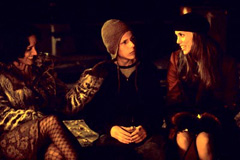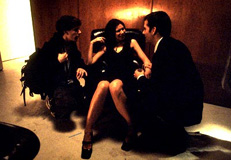|
Newest Reviews:
New Movies -
The Tunnel
V/H/S
The Tall Man
Mama Africa
Detention
Brake
Ted
Tomboy
Brownian Movement
Last Ride
[Rec]≥: Genesis
Hara-Kiri: Death of a Samurai
Indie Game: The Movie
Abraham Lincoln: Vampire Hunter
Old Movies -
Touki Bouki: The Journey of the Hyena
Drums Along the Mohawk
The Chase
The Heiress
Show
People
The Strange Affair of Uncle Harry
Pitfall
Driftwood
Miracle Mile
The Great Flamarion
Dark Habits
Archives -
Recap: 2000,
2001, 2002,
2003, 2004
, 2005, 2006,
2007 , 2008
, 2009 ,
2010 , 2011 ,
2012
All reviews alphabetically
All reviews by star rating
All reviews by release year
Masterpieces
Screening Log
Links
FAQ
E-mail me
HOME
| |
Roger Dodger (Dylan Kidd, 2002)
 The opening scenes of Dylan Kiddís debut feature Roger
Dodger work overtime in establishing Campbell Scottís boorish but
smooth-talking, titular character, and they are excruciating. With his
incessant, empty glibness and predatory impulses as the only thing on display,
the film lacks anything resembling a moral center. He possesses a dangerously
overblown sense of self-confidence that empowers him to act as a nonstop
provocateur. The black hole that is Roger
threatens to suck all life from the universe, or at least all of Lower
Manhattan, but finally the prologue ends with the arrival of Nick, his vaguely
geeky, wide-eyed, sixteen-year-old nephew from Ohio. By this point, Roger has
been so boldly presented as a shallow, characterless bastard that Nick, a virgin
still in high school whoís looking for sexual pointers, is just about the only
foil that could possibly make sense. After all, as the film demonstrates time
and again, any adult would find a dolt like Roger too easy to ignore to create
real confrontation. Still, as their relationship quickly turns into a mentorship
in lady-killing, it strains credibility in its own ways.
The opening scenes of Dylan Kiddís debut feature Roger
Dodger work overtime in establishing Campbell Scottís boorish but
smooth-talking, titular character, and they are excruciating. With his
incessant, empty glibness and predatory impulses as the only thing on display,
the film lacks anything resembling a moral center. He possesses a dangerously
overblown sense of self-confidence that empowers him to act as a nonstop
provocateur. The black hole that is Roger
threatens to suck all life from the universe, or at least all of Lower
Manhattan, but finally the prologue ends with the arrival of Nick, his vaguely
geeky, wide-eyed, sixteen-year-old nephew from Ohio. By this point, Roger has
been so boldly presented as a shallow, characterless bastard that Nick, a virgin
still in high school whoís looking for sexual pointers, is just about the only
foil that could possibly make sense. After all, as the film demonstrates time
and again, any adult would find a dolt like Roger too easy to ignore to create
real confrontation. Still, as their relationship quickly turns into a mentorship
in lady-killing, it strains credibility in its own ways.
 Set mostly during one extended night of bar and
party-hopping, Roger Dodger is far more focused more on the nuances of
its charactersí dialogue and the establishment of mood than the machinations
of its thin plot. Itís got a premise thatís so slight that it might appear
original, but it certainly provides plenty opportunities for more verbal
slickness. Shot using shaky cameras and ever-shifting focus, the film achieves a
degree of spontaneity at the sake of glossiness, and at times, after Nick
arrives on the scene, the relentless fluency and speed of the myriad
conversations feel almost impressionistic. Nickís initiation into a world that
he seemingly hadnít considered before coming to the city creates a far more
interesting emotional arc than anything that the hopelessly self-absorbed Roger
feels, but since Nick only exists as a Gallant to Rogerís Goofus, his
character feels somewhat artificial. It only rarely becomes less than apparent
that lurking behind these clever characters thereís a cleverer screenwriter (director Kidd in this case), delighting himself as he takes turns setting each of
them up for a verbal fall. That sort of narrative scheming seems like a trick
Roger himself would pull, and when it becomes clear that Kidd isnít above it,
it makes it tougher to accept Nickís innocence, no matter how good a job Jesse
Eisenberg does while playing him. Itís not surprising then, considering the
lack of a perspective that truly counteracts Rogerís, that the finaleís
attempt to provide comeuppance for him disappoints. Instead of challenging him
head on, at the peak of his persuasive powers, it reduces him and reflects upon
him, without offering much new insight. Despite any such frustrations, however,
the pleasures that crop up during the night spent with him are almost enough to
make Roger worth recommending.
Set mostly during one extended night of bar and
party-hopping, Roger Dodger is far more focused more on the nuances of
its charactersí dialogue and the establishment of mood than the machinations
of its thin plot. Itís got a premise thatís so slight that it might appear
original, but it certainly provides plenty opportunities for more verbal
slickness. Shot using shaky cameras and ever-shifting focus, the film achieves a
degree of spontaneity at the sake of glossiness, and at times, after Nick
arrives on the scene, the relentless fluency and speed of the myriad
conversations feel almost impressionistic. Nickís initiation into a world that
he seemingly hadnít considered before coming to the city creates a far more
interesting emotional arc than anything that the hopelessly self-absorbed Roger
feels, but since Nick only exists as a Gallant to Rogerís Goofus, his
character feels somewhat artificial. It only rarely becomes less than apparent
that lurking behind these clever characters thereís a cleverer screenwriter (director Kidd in this case), delighting himself as he takes turns setting each of
them up for a verbal fall. That sort of narrative scheming seems like a trick
Roger himself would pull, and when it becomes clear that Kidd isnít above it,
it makes it tougher to accept Nickís innocence, no matter how good a job Jesse
Eisenberg does while playing him. Itís not surprising then, considering the
lack of a perspective that truly counteracts Rogerís, that the finaleís
attempt to provide comeuppance for him disappoints. Instead of challenging him
head on, at the peak of his persuasive powers, it reduces him and reflects upon
him, without offering much new insight. Despite any such frustrations, however,
the pleasures that crop up during the night spent with him are almost enough to
make Roger worth recommending.
* * 1/2
12-05-02
Jeremy Heilman
|